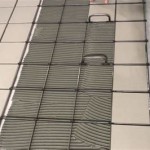How To Glue Vinyl Floor Tiles: A Comprehensive Guide
Vinyl floor tiles are a popular choice for homeowners due to their durability, affordability, and ease of installation. While most vinyl floor tiles can be installed using a peel-and-stick method, some require the use of adhesive or glue. This guide will provide you with step-by-step instructions on how to glue vinyl floor tiles, ensuring a professional-looking and long-lasting installation.
Materials You'll Need:
- Vinyl floor tiles
- Vinyl floor adhesive or glue
- Notched trowel
- Tape measure or ruler
- Utility knife
- Caulk gun
- Caulk
- Clean rags or towels
Step 1: Prepare the Subfloor
Before you begin laying the vinyl floor tiles, it's crucial to prepare the subfloor. The subfloor must be clean, dry, and level. Remove any dirt, dust, or debris from the subfloor surface. If there are any uneven areas, level them out using a self-leveling compound.
Step 2: Measure and Cut the Tiles
Measure the area where you want to install the vinyl floor tiles and calculate how many tiles you will need. Cut the tiles to the desired size using a utility knife and a straightedge. Make sure the cuts are clean and precise for a seamless fit.
Step 3: Apply the Adhesive or Glue
Using a notched trowel, apply the vinyl floor adhesive or glue to the subfloor. Follow the manufacturer's instructions for the specific adhesive or glue you are using. The notched trowel will help to create an even spread of the adhesive and ensure proper bonding.
Step 4: Lay the Tiles
Starting from a corner, carefully place the first vinyl floor tile on the adhesive-covered subfloor. Press the tile firmly to ensure it adheres properly. Continue laying the tiles, working your way across the room. Make sure the tiles are aligned correctly and there are no gaps between them.
Step 5: Stagger the Joints
To prevent buckling or warping, stagger the joints of the vinyl floor tiles. This means that the seams of adjacent tiles should not line up directly with each other. Staggering the joints will help to distribute the weight of the floor evenly.
Step 6: Trim Excess Tiles
Once the tiles are laid, trim any excess material around the edges of the room using a utility knife. Cut the tiles carefully to ensure a clean and professional finish. Be sure to wear safety glasses while cutting.
Step 7: Apply Caulk
To seal the edges of the vinyl floor tiles and prevent moisture from seeping in, apply a bead of caulk around the perimeter of the room and along any seams between the tiles. Use a caulk gun to apply the caulk evenly and smoothly. Wipe away any excess caulk with a clean rag or towel.
Step 8: Allow the Adhesive to Cure
Follow the manufacturer's instructions for the adhesive or glue you used to determine the curing time. It's important to allow the adhesive to cure completely before walking on or using the floor. This will ensure a strong and durable bond between the tiles and the subfloor.
Tips for Gluing Vinyl Floor Tiles:
- Use a high-quality vinyl floor adhesive or glue specifically designed for vinyl flooring.
- Make sure the subfloor is clean, dry, and level before applying the adhesive or glue.
- Stagger the joints of the vinyl floor tiles to prevent buckling or warping.
- Trim excess tiles carefully using a sharp utility knife.
- Apply caulk around the perimeter of the room and along any seams between the tiles to prevent moisture damage.
- Allow the adhesive to cure completely before walking on or using the floor.

Easy Glue Down Tile Installation Vinyl Flooring

How To Glue Vinyl Flooring

Luxury Vinyl Tile Installation Diy Family Handyman

Luxury Vinyl Flooring Vs Glue Direct Wood

Floor Pops Myriad Self Adhesive Vinyl Tile

How To Replace Vinyl Floor Tiles Dummies

1 2mm 2 0mm Diy Wood Vinyl Floor Glue Down Tiles Self Adhesive L And Stick Pvc Flooring China Sticker Made In Com

How To Install Vinyl Floor Tiles Easy Diy Guide

Dc Fix Oriental Tiles Green Self Adhesive Vinyl Floor Tile

The Advantages Of Using Glue Down Vinyl Tiles In Your Home Pro Flooring
Related Posts








